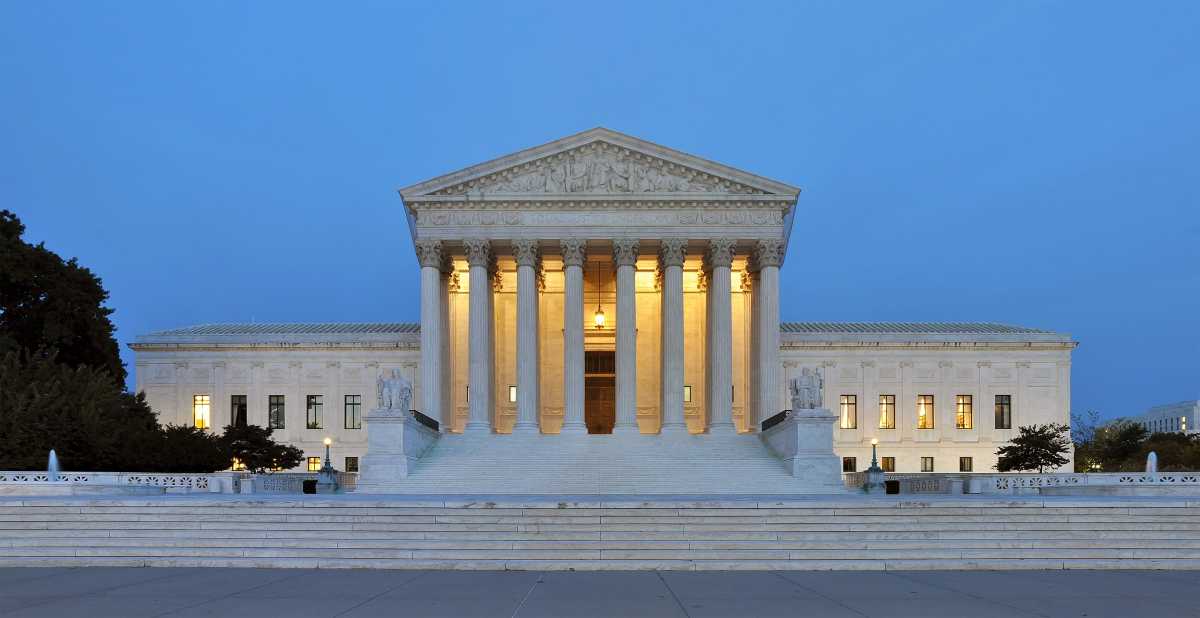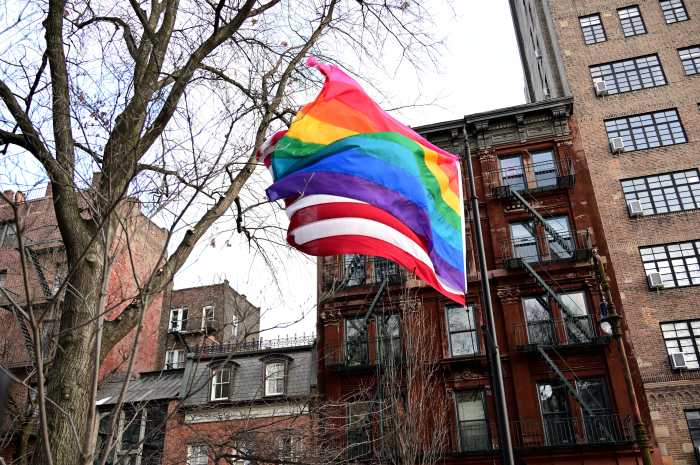The US Supreme Court heard arguments on April 22 in Mahmoud v. Taylor, in which a group of parents of elementary school students in the Montgomery County School District in Maryland are challenging the district’s decision to deny parents the right to have advance notice and “opt out” their children from lessons in pre-K through grade 5 that use books that include LGBTQ characters and touch on LGBTQ issues, such as same-sex marriage, Pride parades, and childhood same-sex crushes.
In October 2022, the school board announced that it was adding a collection of story books to its elementary school curriculum that would touch on LGBTQ issues, having decided that the existing curriculum did not adequately reflect the diversity of family life within the large school district, which has more than 200 schools and more than 160,000 students, of which at that time more than 70,000 were attending the elementary schools.
The board released the titles of the books publicly. At that time, the district had a policy of informing parents when lessons would take place that might raise issues and allowing parents to “opt out” their children from lessons that they found objectionable based on their own religious beliefs. Maryland state law encourages school districts to have such policies, although it doesn’t require them. The school board also directed that these books should be used as age appropriate for the specified grades, even though during the book selection and vetting process some teachers and principals had expressed disagreement about their age appropriateness. The board did not want the books just to sit on the shelf, but specifically directed that they be used in lessons with the students, as part of the English language curriculum for the elementary grades.
Some parents opposed the use of these books in lessons with their children, and the school board claimed that it received so many requests to “opt out” students that it became “unfeasible” to continue the advance notice and “opt-out” policy, and abruptly dropped the policy without explanation. This prompted three families of varying Muslim and Christian faiths to file a federal lawsuit claiming a violation of the parents’ and students’ free exercise and free speech rights under the First Amendment, the parents’ substantive due process rights under the 14th Amendment, and Maryland law. They are represented by Eric Baxter and the Becket Fund for Religious Liberty, which frequently represents opponents of LGBTQ rights.
Their case was assigned to District Judge Deborah Boardman, an appointee of President Joseph R. Biden, Jr. Along with their complaint, they moved for a preliminary injunction seeking to restore the prior advance notice and “opt-out” policy while the case was pending. Judge Boardman denied that motion on August 24, 2023. The plaintiffs appealed to the US Court of Appeals for the 4th Circuit, where a three-judge panel voted 2-1 to affirm Judge Boardman’s denial of the motion. The opinion for the panel majority was written by Judge G. Steven Agee, who was appointed by President George W. Bush, and was joined by Judge DeAndrea Benjamin, who was appointed by President Biden. The dissenter was Judge A. Marvin Quattlebaum, Jr., who was appointed by President Donald J. Trump, and who argued that the board should have followed its existing opt-out policy to accommodate the religious beliefs of the parents.
The attention focused on this case, particularly by those concerned with “religious freedom,” has been intense, as signified by the long list of amicus curiae (“friend of the court”) briefs filed (65), and by the Trump administration’s putting its thumb on the scales by sending Principal Deputy Solicitor General Sarah M. Harris to make an argument on behalf of the government, supporting the plaintiffs, sending a particular signal to the three Trump appointees on the bench.
The essence of the district court and panel decisions, based on decades of Supreme Court and federal appellate precedents, was that courts should generally defer to the curricular decisions of school boards. Much of that litigation was focused on charges that school boards were engaged in impermissible censorship when they removed books from school library collections because the books had become controversial. The issue of advance notice and opt-outs due to parents’ religious beliefs is a relatively new one, at least on this scale, and there is not so much appellate precedent, but what there is has tended to support the school districts’ decisions.
However, this comes up against the recent trajectory of the Supreme Court’s Free Exercise decisions, which show a steady movement towards expanding the rights of people with religious objections winning exceptions from complying with laws or school district rules. In the area of LGBTQ rights, this most famously includes such decisions as Masterpiece Cakeshop and 303 Creative, both of which were referred to during the April 22 hearing, where businesses whose owners had religious objections were seeking exceptions to a Colorado anti-discrimination law when it came to individually designed wedding cakes or wedding websites, but the scope of religious exceptionalism has been wide-ranging beyond that, to the point where expanding free exercise of religion has become a signal goal of the conservative justices of the Court.
Judge Boardman’s denial of the preliminary injunction was in line with existing cases, as reflected in the Fourth Circuit panel’s majority decision, but Judge Quattlebaum’s dissent seemed more in tune with where the Supreme Court conservatives are heading on religious exceptionalism, so it was not particularly surprising when the Supreme Court announced that it would review the case.
Technically, the issue before the Supreme Court is whether Judge Boardman abused her discretion in rejecting the motion for preliminary injunction on the grounds she cited, which was her conclusion that the plaintiffs were unlikely to be successful in proving that the school district’s policy violates their constitutional rights. Technically, what is at stake on this appeal is not a ruling by the Supreme Court on whether the parents have a right to restoration of the advance notice and opt-out policy, but rather whether the parents have a strong enough constitutional argument to justify the extraordinary step of ordering restoration of that policy while the litigation is pending, before there has been pre-trial discovery and a final ruling on the merits of their claim by the district court based on a fully-developed record.
Listening to the oral argument recording, which can be heard on supremecourt.gov, one could conclude that members of the court, especially the conservative members who hold a 6-3 majority, were really focused on the merits, as to which they sympathized with the plaintiffs. Chief Justice John R. Roberts, Jr., who is sometimes the “swing vote,” occasionally siding with the three Democratic appointees — Justices Sonia Sotomayor, Elena Kagan, and Ketanji Brown Jackson — did not speak very frequently during the argument, leaving most of the heavy questioning to Justice Samuel Alito, who is the Court’s most outspoken proponent of a very broad free exercise right. Justice Clarence Thomas, who is generally considered the most conservative justice, and Justices Neil Gorsuch, Brett Kavanaugh, and Amy Coney Barrett were also very active questioners.
The issues that seemed to most inflame the conservatives were cherry-picked quotes from one or two of the books, the fact that the district had used advance notice and opt-outs for many years before abandoning that policy, that the abrupt change of the policy was not publicly explained or justified apart from the vague assertion that it quickly became unfeasible to administer after the LGBTQ book collection was announced, and that it appears that many other school districts around the country have long had opt-out policies for parents with religious objections and seemed to find them possible to administer.
The school district’s attorney, Alan E. Schoenfeld, a partner at WilmerHale LLP, a major national law firm, was well prepared with answers on some of these issues, but for many of them the factual record before the trial court in deciding the preliminary injunction motion is rather threadbare. For example, there was no evidence about how many parents had sought opt-outs compared to earlier experience, or about the numbers faced by other school districts in administering their opt-out policies. Schoenfeld pointed out that if large numbers of students are “opted out,” an absenteeism issue is created, and the school also has to come up with alternative rooms and people to supervise while these elementary school students are away from their classrooms.
If large numbers of students get up to walk out when the LGBTQ books are being used, that also sends a message to the other students who remain in the class. One of the school board’s motivations for introducing the LGBTQ books into the curriculum was to make students who might identify as LGBTQ or have LGBTQ parents, siblings, or friends feel welcome and represented, which would be undercut by a sudden exodus of other students from the classroom when any of these books are discussed. There was lots of factual speculation during the argument, which is not surprising when the appeal is being taken from a preliminary injunction ruling when there hasn’t yet been a trial on the merits.
Judge Boardman concluded, based on what she heard from the parties up to that point and after examining the books that were singled out by the plaintiffs as objectionable, that the school board’s use of the storybooks did not cross some line from “permissible influence” to “potentially impermissible indoctrination,” that students were not likely to be “coerced” in their religious beliefs by reading these books, that the parents were not being “coerced” in their religious beliefs, and that the school board’s reasons for adding the books to the curriculum were “rational” and legitimate.
This stimulated some argument among the lawyers and the justices about whether these were the appropriate tests, whether this case was about mere “exposure” to the books as opposed to the books and the teacher signaling a pro-LGBTQ point of view from which the parents asserted a right to shield their impressionable children. In other words, a substantial, and sometimes heated, argument was taking place about what the legal standards should be.
Attorney Schoenfeld pointed out that a decision by the court for the parents would significantly change the legal status quo on this issue, and likely lead to an upsurge in parental requests for “opt-outs” that would significantly change public education in this country. Whether that prospect would give pause to the Court’s conservatives is an open question.
Justice Kagan was particularly insistent on the need to do some “line-drawing” between what is or is not permissible when the school is presenting material to students that parents find interfering with their attempt to imbue their children with the parents’ religious mindset, and several of the conservative justice cast aspersions on the argument that parents with religious objections could enroll their children in religious schools, when such an option might not be affordable for them and shouldn’t be required in a state where taxes are extracted from the public with the promise of a free public education.
In the end, a listener familiar with the trends in Supreme Court decision-making under the Free Exercise Clause was likely to conclude that there was not a majority on the court that would affirm Judge Boardman and the Fourth Circuit panel, although sometimes one ends up being surprised about how the Supreme Court comes down in controversial cases.
Some suspense certainly remains after this argument. The case should be decided by the end of the Supreme Court’s term in June or early July.





































